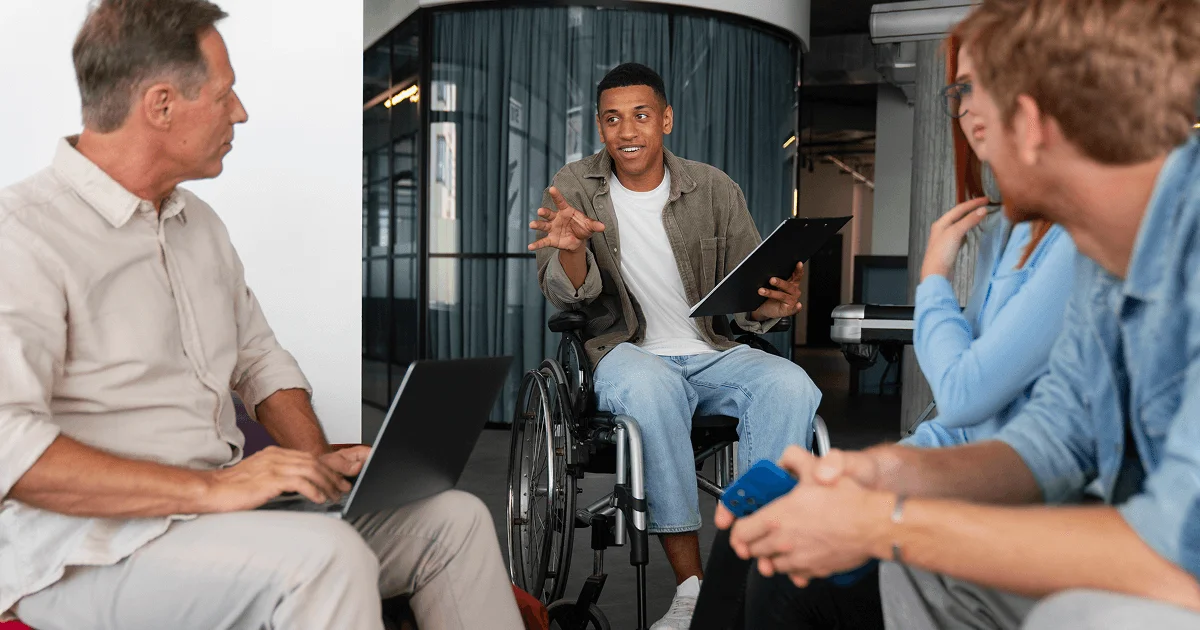Blog
Leadership and Management Innovation [Link Between Them]
Explore the link between leadership and management innovation and learn how your behavior shapes change, adaptability, and performance across teams.
Read article
8 Best AI Tools for Innovation in 2026 [Comparison List]
Explore the best AI tools for innovation to help you streamline workflows, spark creativity, and accelerate breakthroughs across your projects.
Read article
4 Types of Innovation Strategy: Which One Should You Adopt?
Learn the main types of innovation strategies to help you improve products, optimize processes, and rethink how your business creates value.
Read article
AI vs. Human Creativity: Which One is Better in 2026?
Compare AI vs human creativity to understand how machines amplify ideas while your emotion, intuition, and insight drive true originality.
Read article
Inclusive Innovation: Definition, Importance & Examples
Discover what inclusive innovation is and learn how bringing diverse voices into the process helps you create solutions that are more impactful.
Read article
8 Tips for Creating a Growth Mindset Culture in 2026
Explore proven tips for creating a growth mindset culture that helps you inspire learning and build a more resilient, motivated team.
Read article
How to Choose the Best Innovation Management Software in 2025
Learn how to choose the best innovation management software that fits your goals, boosts collaboration, streamlines processes, and drives growth.
Read article
Incremental vs Radical Innovation: Key Differences [+Tips]
Explore incremental vs. radical innovation to understand their impact, challenges, and how you can combine both to drive lasting growth.
Read article
Top 6 HYPE Innovation Alternatives to Consider in 2025
Explore the best Hype Innovation alternatives, their features, and how they can help boost your brand, enhance marketing, and drive business growth.
Read article
8 Corporate Innovation Best Practices You Should Know About
Explore corporate innovation best practices to drive growth, boost competitiveness, and foster a culture of creativity and strategic advancement.
Read article
Technology Innovation Management: Complete Guide [+Pro Tips]
Explore technology innovation management to align strategy, streamline workflows, boost agility, and turn bold ideas into real impact.
Read article
30 Icebreaker Activities That Actually Help Teams Innovate
Discover top icebreaker activities to spark creativity, build trust, and energize your innovation team for bold collaboration and fresh ideas.
Read article
What is Disruptive Innovation in Business: Your 2025 Guide
Discover the differences between disruptive and sustaining innovation and learn which approach is the best suitable for your organization’s growth.
Read article
7 Radical Innovation Examples for 2025: Definition & Benefits
Discover more about radical innovation and its impact on consumer satisfaction and business success. Explore real-world examples of radical innovation.
Read article
Corporate Innovation: Definition, Benefits & Examples
Explore the corporate innovation definition, benefits, and examples to help your business stay agile, competitive, and ready for future growth.
Read article
10 Planview Alternatives to Consider [2025 Comparison]
Discover the best Planview alternatives to streamline project management, boost collaboration, and align your tools with team goals.
Read article
7 Crucial Benefits of Innovation in Business To Know in 2026
Explore the importance of innovation in business and learn how to drive growth, boost efficiency, and stay competitive in a changing market.
Read article
Idea and Innovation Management: Key Differences [+Pro Tips]
Explore the key differences between idea and innovation management and learn how combining both can drive real impact across your organization.
Read article
6 Principles of Innovation Management You Should Know
Discover the principles of innovation management to transform ideas into impactful solutions and foster continuous growth in your organization.
Read article
What is Idea Management: Benefits & Examples [+ Pro Tips]
Discover what idea management is and learn how to capture, evaluate, and implement ideas to drive innovation and empower your team.
Read article
7 Best Itonics Alternatives to Consider in 2025
Discover top Itonics alternatives to streamline innovation, boost collaboration, and find the perfect tool to match your team's unique needs.
Read article
5 Reasons Why Innovation Fails & How To Prevent Them
Discover key reasons why innovation fails and learn how to avoid common pitfalls to turn your next big idea into a lasting success.
Read article
How to Manage Your Innovation Pipeline Effectively in 2025
Discover how to manage your innovation pipeline effectively by turning ideas into impact with smart strategies, tools, and structured processes.
Read article
Understanding the Innovation Management Process [Full Guide]
Discover the essential phases of the innovation management process and explore different methods to drive successful innovation in your business.
Read article
5 Types of Creativity and How They Work
Discover the different types of creativity that can drive innovation in your organization, including different types of creativity.
Read article
How AI-driven Innovation Will Accelerate Your Industry
Discover how AI-driven innovation will accelerate your industry with strategies to boost creativity, efficiency, and long-term competitive edge.
Read article
10 Qmarkets Alternatives to Consider in 2025
Discover top Qmarkets alternatives to boost innovation, streamline idea workflows, and drive real results across your organization.
Read article
5 Tips to Build Cross-Functional Teams to Drive Innovation
Discover tips to build cross-functional teams to drive innovations and achieve better collaboration, faster decisions, and breakthrough results.
Read article
What is Product Innovation? 6 Strategies to Implement
Explore what product innovation is and how to use powerful strategies to boost customer value and turn great ideas into superior products.
Read article
7 Types of Intrapreneurship You Should Know About in 2025
Discover key types of intrapreneurship and explore strategies to boost innovation, empower employees, and align ideas with business goals.
Read article
How to Measure Innovation ROI & Why It's Important
Learn how to measure the ROI of innovation projects effectively and why it’s essential for making smarter, bolder decisions for your business.
Read article
How to Motivate Employees to Innovate - 9 Smart Tips
Discover powerful ways to motivate employees to innovate, foster creativity, and drive business success with smart strategies and a growth mindset.
Read article
20 Innovation KPIs to Measure Success (and Examples)
Track innovation KPIs to optimize processes, boost efficiency, and drive success. Explore key metrics, real-world examples, and best practices.
Read article
HYPE Innovation vs. Jira: Which One Is Better for You?
Compare Jira and HYPE to discover key differences in features, pricing, and benefits, helping you choose the best tool for your project needs.
Read article
Late to the AI Party? We Took Our Time to Get It Right
Discover how rready's AI-native platform revolutionizes corporate innovation, making enterprises smarter and faster with powerful AI-driven features.
Read article
Corporate Innovation: 5 Frameworks & Process
Discover what a corporate innovation framework is, its importance, and how it fosters growth, adaptability, and long-term business success.
Read article
7 Corporate Innovation Trends You Can't Miss in 2025
Explore the latest corporate innovation trends, from AI and sustainability to cost optimization and innovation accounting.
Read article
The 7 Best Idea Management Software Tools to Choose in 2025
Discover the best idea management software to streamline innovation, boost collaboration, and drive business growth effectively.
Read article
Innovation Roadmap - Everything You Need to Know
Discover what an innovation roadmap is, its importance, and how it drives growth and competitiveness for business success.
Read article
Innovation Metrics: Balancing Short- and Long-Term Goals
Learn how to balance short-term and long-term goals in innovation management. Discover the importance of innovation metrics and measuring success.
Read article
8 Best Corporate Innovation Tools To Consider in 2025
Discover the best corporate innovation tools to drive growth, boost competitiveness, and foster success in your business.
Read article
6 Brightidea Alternatives to Consider in 2025
Discover top Brightidea alternatives to streamline innovation management, boost collaboration, and drive business growth effectively.
Read article
9 Innovation Management Frameworks You Should Know About
Discover the key innovation management framework, its significance, and how it drives growth, boosts competitiveness, and fosters business success.
Read article
6 Essential Innovation Skills for Every Organization In 2025
Discover the essential innovation skills your team needs to stay agile, spark creativity, and turn bold ideas into real, lasting impact.
Read article
8 Best Sopheon Alternatives to Consider in 2025 [Comparison]
Explore the best Sopheon alternatives to boost your innovation strategy with flexible tools, smarter workflows, and end-to-end idea management.
Read article
9 Best Innovation Management Tools To Choose in 2025
Discover top innovation management tools to capture ideas, foster creativity, manage workflows, and turn innovation into real business impact.
Read article
9 Types of Innovation in Business & Examples [2025]
Explore the types of innovation in business, their significance, and how they drive growth, enhance competitiveness, and elevate your success.
Read article
The Importance of Feedback in Corporate Innovation [2025]
Discover how giving effective feedback can fuel creativity and innovation. Learn key practices for empowering your team to thrive in corporate innovation.
Read article
The 70-20-10 Rule in Innovation & How To Implement It
Discover the 70-20-10 Rule in corporate innovation and how it can drive success in your organization. Learn how to implement this framework effectively.
Read article
How to Achieve Product-market Fit in Innovation
Discover how to achieve product-market fit in innovation and ensure your products align with customer needs, driving growth and competitive advantage.
Read article
10 Signs Your Innovation Strategy Needs an Overhaul
Discover the 10 crucial signs that indicate your innovation strategy needs an overhaul and learn how to revitalize your approach to stay competitive.
Read article
How to Transition from Traditional to Agile Innovation
Learn how to transition from traditional to agile innovation, improving speed, flexibility, and customer satisfaction while reducing risks and costs.
Read article
A Guide to Autonomous Innovation
Learn how autonomous innovation, powered by AI, can transform businesses by streamlining processes, reducing costs, and enhancing decision-making.
Read article
Stakeholder Management in Innovation
Learn more about the importance of stakeholder management in innovation to enhance collaboration, build trust, and drive successful innovation outcomes.
Read article
How Lean Teams Can Achieve Maximum Impact in Innovation
Many teams struggle to maximize impact with limited resources, but lean teams excel at enhancing efficiency and creativity within budget.
Read article
The Comprehensive Guide to Corporate Entrepreneurship Types
Dive into our comprehensive guide to corporate entrepreneurship types and how to choose the right model to fuel growth and success in your company.
Read article
Overcoming Barriers to Innovation in Traditional Industries
Explore how traditional industries can overcome barriers to innovation, such as bureaucracy, lack of time, no direction, and capital.
Read article
10 Successful KICKBOX Intrapreneurship Projects
Discover 10 successful KICKBOX Intrapreneurship projects that have transformed corporate innovation and yielded remarkable results.
Read article
Idea to Impact: Innovation in Healthcare through KICKBOX
Explore the impact of the KICKBOX Innovation Management program in healthcare at CSS, showcasing employee-led innovation.
Read article
How to Create an Innovation Culture
Creating a culture of innovation in organizations is no small feat. Learn more about how you can involve your employees and actively promote innovation.
Read article
Innovation Funnel: Definition, Importance & Stages [Guide]
Deep dive into the stages of the innovation funnel and strategies from ideation to launch. Explore our guide for comprehensive insights.
Read article
A Guide to Managing Your Innovation Portfolio
Discover the importance of a dual innovation portfolio approach and learn how to manage innovation projects from idea to implementation.
Read article
A Guide to Executing Innovation Strategy
Learn how to effectively execute an innovation strategy with a clear stage-gate process, validate ideas early, and reduce risks for business success.
Read article
What is Ideation Innovation and Why Is It Important?
Learn how ideation drives innovation in businesses, the importance of generating diverse ideas, and techniques for effective idea generation.
Read article
Key Characteristics of Successful Entrepreneurs
Find out more about the unique characteristics of entrepreneurs and how their mindset can benefit corporate innovation efforts in your company.
Read article
A Comprehensive Guide to Innovation Accounting
Discover a comprehensive guide to Innovation Accounting and learn how to adopt a structured approach to measuring and managing innovation.
Read article
Exploration Vs Exploitation in Innovation: Full Guide
Discover how balancing exploration and exploitation strategies can drive innovation, enhance efficiency, and foster business growth in dynamic markets.
Read article
Continuous Improvement vs Innovation: What's The Difference?
Explore the differences between innovation and continuous improvement, and how leveraging both can drive organizational growth and success.
Read article
4 Best Examples Of Corporate Social Innovation in 2025
Discover examples of corporate social innovation driving impactful change in society and see how an innovation management solution can aid along the way.
Read article
What is Incremental Innovation?
Read more about the role of incremental innovation in driving business growth and improving product performance.
Read article
What is Ambidextrous Innovation: A Complete Guide
Discover how ambidextrous innovation combines short and long-term goals to foster creativity, collaboration, and continuous progress in your organization.
Read article
What is Idea Execution in Innovation? A Detailed Guide
Idea execution is a vital part of the innovation process. This is because if ideas exist but are not executed, these ideas will not bring any added value.
Read article
What is Architectural Innovation: Examples & Benefits
Learn about architectural innovation and how it can help organizations improve existing products, introduce new capabilities, and reduce costs.
Read article
What is the Kickbox Method - Everything You Need To Know
Discover the power of the Kickbox method - a bottom-up innovation management approach that has created valuable business cases in over 1000 companies.
Read article
What is Innovation Management? [Full Guide]
Learn more about innovation management, why it's needed for business success, where it originated, and how to start an innovation management program.
Read article
5 Challenges & Disadvantages of Intrapreneurship in 2025
Learn 5 crucial things for cultivating an intrapreneurship culture. Discover the challenges of intrapreneurship and how to navigate them.
Read article
What is Bottom-up in Innovation: Pros & Cons
Learn how bottom-up innovation encourages idea generation from all employees and its pros and cons compared to top-down innovation.
Read article
rready Raises $4M Series A and Signs Global Corporations
rready raises funding on track record of accelerating innovation at global corporations such as, ZF Group, Compeer, and Swisscom.
Read article
Pick a Hat: 6 Thinking Hats to Combat Subjectivity
Foster innovation in your company with the 6 Thinking Hats method. See why tackling problems from different angles can lead to successful innovation.
Read article
Why Rendanheyi is Great for Modern Corporate Innovation
Discover the Rendanheyi Model, a revolutionary approach to corporate innovation that puts the user first and encourages company-wide innovation.
Read article
AR and Developing Ideas and Prototypes
Could Augmented Reality (AR) be the secret weapon in your innovation strategy? Absolutely. Learn why it’s such a valuable tool.
Read article
Why Employee Engagement is Key to Company Success
Employees and innovation in the workplace go hand-in-hand. Therefore, retaining their engagement should be a priority at each stage of the process.
Read article
3 Essential Types of Innovation for Every Company
Discover how to optimize your company’s output by fostering radical, incremental, and disruptive innovation.
Read article
How to Choose the Best Employee-Driven Ideas to Invest in
Analyzing contextuality, viability, feasibility, and desirability is key to choosing innovations that will boost your revenue and earnings. Learn how.
Read article
Why Experimentation Is a Crucial Part of Innovation
If your business is truly committed to corporate innovation, it must encourage its employees to experiment with new ideas.
Read article
Success Stories of the KICKBOX Program
KICKBOX by rready has helped over 40 organizations tap into the power of innovation. Have a look at a few real-life success stories from our peers.
Read article
Top Management's Role in Driving Innovation Culture
Learn the key responsibilities of top management in driving an innovation culture and how to transform your organization's approach to innovation.
Read article
Here's Why Employee-Driven Innovation Works
Are you looking to take company-wide innovation to the next level? Discover why letting employees take the lead could get your business ready for success.
Read article
6 Methods for Encouraging Risk-Taking in the Workplace
Building a company culture where innovation and taking risks is the norm, can transform the future of your business. Learn how to make it happen.
Read article
7 Habits of Highly Innovative Teams
Are you an innovation leader hoping to encourage innovation but don’t feel 100% confident in what innovative teams actually look like? Find out more here.
Read article
Advantages & Disadvantages of Innovation in 2025 [Guide]
rready explores the pros and cons of innovation in business. Then, we’ll share a few strategies for responsible innovation.
Read article
KICKBOX Success Story: INFRAVISTA
Discover how INFRAVISTA successfully leveraged the KICKBOX program to innovate mobile site infrastructure, driving energy savings and improvements.
Read article
3 Steps to Manage Innovation Risk
Innovation risks are crucial to consider when designing new products and services. Learn how to overcome these major risks here.
Read article
How KICKBOX Empowered bottleplus
From small beginnings to raising CHF 800,000 on Die Höhle der Löwen: see how the KICKBOX program supported Swiss startup bottleplus on their journey!
Read article
Disruptive vs. Radical Innovation - What's The Difference?
The difference between disruptive vs. radical innovation is that radical innovation doesn’t just disrupt industry—it creates something completely new.
Read article
Working Around the Barriers to Intrapreneurship
Overcome intrapreneurship barriers by boosting employee engagement, fostering innovation, creating a supportive culture.
Read article
How Can a Business Encourage Intrapreneurship?
Explore how businesses encourage intrapreneurship by fostering innovation, empowering employees with resources, and offering time for experimentation.
Read article
Intrapreneurship Benefits for Business
Intrapreneurship benefits for business go beyond just making new products. A strong intrapreneurial culture is good for growth, retention, and recruiting.
Read article
What are the Key Differences Between R&D and Innovation
Explore the key differences between R&D and innovation, and how their collaboration drives value creation, growth, and competitive advantage in business.
Read article
How do Patents Act as an Incentive for Tech Innovation?
Learn how patents act as an incentive for tech Innovation by empowering teams, safeguarding breakthroughs, and promoting a culture of creativity.
Read article
3 Advantages and Disadvantages of Prototyping
Learn about prototyping's benefits and challenges, from early error detection to cost issues, and discover how to incorporate it into your process.
Read article
How to Write an Innovation Problem Statement: Step-by-Step
Learn how to write an effective innovation problem statement that guides your organization's efforts and helps you achieve your goals in four simple steps.
Read article
Golden Circle Method for Intrapreneurial Success
An innovation manager’s guide to the Simon Sinek Golden Circle Method, and why early implementation is critical.
Read article
Blue Ocean vs. Red Ocean Strategy: Guide + Examples
Discover the difference between blue ocean and red ocean strategy. Explore examples and determine which strategy is right for innovation in your company.
Read article
Responsible Innovation: A Complete Guide
Find out what defines a responsible innovation plan. Then, examine what it takes to implement one in your company.
Read article
Disruptive vs. Sustaining Innovation - Key Differences
Discover the differences between disruptive and sustaining innovation and learn which approach is the best suitable for your organization’s growth.
Read article
Why is Research and Development Important in Innovation?
Discover the importance of R&D in innovation and how it can help your business to maintain relevance, survive market changes and become a market leader.
Read article
4 Disruptive Innovation Benefits & How to Leverage Them
Small companies struggle in the market against established giants. Discover how Disruptive innovation can give your business a competitive advantage.
Read article
7 Characteristics of Innovative Leaders: Do you Have Them?
Learn how to become an innovation leader by building diverse teams, fostering creativity, removing fear, and investing in the right tools to drive success.
Read article
Advantages & Risks of Intrapreneurship You Should Know
Intrapreneurship can offer you the same benefits as entrepreneurship, without the risk. Here are the top advantages of intrapreneurship you should know.
Read article
5 Best Innovation Management Practices for Leaders
Here are five innovation management best practices for business leaders rready to grow their business from the inside out.
Read article
Intrapreneurship vs. Corporate Entrepreneurship
Discover the difference between intrapreneurship and corporate entrepreneurship and understand the best model for business innovation in your company.
Read article
A Corporate Entrepreneurship Strategy for Sustainable Growth
Learn how to implement a sustainable corporate entrepreneurship strategy through building innovation teams, setting goals, and fostering the right culture.
Read article
KICKBOX Success Story: Office Monitoring With thingdust
Learn how Stefan Landolt's project, thingdust, evolved from a personal laundry room idea to a successful office space monitoring system.
Read article
Disruptive Innovation and Technology: Where Do You Fit In?
Learn the differences in disruptive innovation vs. disruptive technology and the technologies that support teams in disruptive innovation projects.
Read article
Making Innovation a Key Strategic Pillar at Implenia
Explore how Implenia uses KICKBOX to innovate in the construction industry and drive intrapreneurship. Learn more about their successes and challenges.
Read article
rready Makes Innovation Management Globally Scalable
GETKICKBOX becomes rready AG, with an international network of investors led by Californian venture capitalists FYRFLY Venture Partners.
Read article
Nine Learnings After Four Years of Intrapreneurship
Discover key learnings from implementing intrapreneurship with KICKBOX. Learn how to empower innovators and drive company-wide innovation.
Read article
5 Tips to Ensure Successful Coaching of Intrapreneurs
Here are five essential tips for successfully coaching intrapreneurs, from our certified KICKBOX coaches to ensure innovation success for your company.
Read article





























































































































